Home 2012 Retrospective: Q&A With Juggernaut Games
by HSM Editorial Staff, answers courtesy of the Juggernaut team
It’s clear that 2012 was perhaps a “peak oil” year for Home; it was the year in which Home completed its metamorphosis into a gaming platform, and the last full year before the new console generation came roaring to the forefront. While Home likely has a few years left in it, we wanted to reach out to Home’s developers and see what they thought about 2012.
HomeStation’s editors put together a precise series of questions and e-mailed them out to our friends in the Home development community. As a publication which prides itself on analyzing Home from a behavioral economics standpoint, we wanted to ask somewhat deeper questions than the usual fare. The result is that some of the answers we got were amazing.
Our first spotlight goes to the Home developer which arguably gained the most visibility in 2012: Juggernaut.
HSM: What was your overall strategy for 2012 as it commenced? Did you realize the annual goals you set out to achieve?
A: Our overall strategy for 2012 was the same as it has always been – make cool stuff that adds something interesting to the Home experience. I think we did that, and we will continue to make that our priority moving forward. The market is currently flooded with content, and we have to play to our strong suits. Our products are often more whimsical or off the wall than many other Home developers – they may not resonate with some users because of that fact, and that’s fine. Our focus is on allowing users to expand their experience by bringing more fun and interactivity into your Home apartments, your Home activities and your Home relationships.
HSM: 2012 was Home’s busiest year ever for virtual content. What steps did you take, from a marketing perspective, to try to elevate the visibility of your brand and your commodities?
A: One of our main marketing objectives was to increase user awareness of the Juggernaut Games brand by maintaining a more consistent presence in the Home store. In our first year as Home developers, we made a big splash with Cutteridge, and then moved to working almost exclusively on contract projects for about 5 or 6 months. As a result, by the time we released the MiniBots: Battlebox (our second significant Home release) no one really remembered who we were anymore. Although at the time, those contracts were important for us, they didn’t leave us in the best position in terms of brand awareness, especially considering that Sony decided to transition away from sponsoring large amounts of third party content. The bottom line is that if users have no idea who you are they’re going to have difficulty finding your content on the Home store, and that means huge losses in potential sales. We set out to correct this issue and have been maintaining a more ambitious release schedule, which has definitely helped us to create a bigger name for ourselves among Home users.
HSM: Of the content you released in 2012, what was the most fiscally successful for you? Was this expected, or was it a pleasant surprise?
A: Based on all factors, right now it looks like Cutteridge Ghost Stories and the Winter Adventure Pack were relatively close if you consider profits per dollar of investment. Cutteridge is still one of our most popular spaces, and Halloween tends to be big on Home so we were definitely hoping that one would prove successful for us. The success of the winter pack was more of a pleasant surprise, but I do think there were some very unique items there and obviously seasonal content seems to sell well.
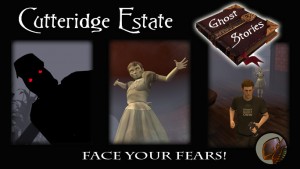 HSM: If there was one commodity or project released in 2012 that you wish you could go back and modify, what would it be – and why?
HSM: If there was one commodity or project released in 2012 that you wish you could go back and modify, what would it be – and why?
A: The first thing that comes to mind is the Cutteridge Ghost Stories. I wouldn’t change how it exists now, but I would definitely alter how we went about releasing it. We knew from the beginning that we wanted to do an update for the space, and we were concerned about fitting it all into memory. We knew we were going to have to do some optimization of the original Cutteridge minigame in order to fit everything in. Because we were pressed for time to get the update out, we decided that we would temporarily remove the original minigame to get it optimized and make it work within the new Cutteridge. At the time, we were thinking “oh no big deal, that game is really old, probably no one will even notice if we pull it out for a few weeks.” Turns out that was a pretty naive assessment of the situation. In fact Home users noticed, cared, and were disappointed if not incensed about the loss of the game. The furor died down and the release was successful despite the negative start, but it might have been better off if we hadn’t had such a negative response during the build-up phase to release.
HSM: Home has overtly shifted into more of a gaming platform, rather than a social network for gamers. Does your product lineup tend to realize greater fiscal success with gaming-related sales in Home, or with social commodities (clothes, locomotions, estates, etc.)?
A: In our experience, the social commodities are definitely more financially successful. That said, our only foray into creating a gaming experience is MiniBots: Battlebox and MiniBots Training Facility. We have not experimented with more social and casual gaming experiences, which might be more suited to the Home audience. There are also other factors that may have contributed to Minibots not being a financial success for us – including a number of technical delays in development and the pricing models used.
HSM: Any good business studies what its competition is doing. What would you say is the most valuable lesson(s) you’ve learned from your fellow developers this past year?
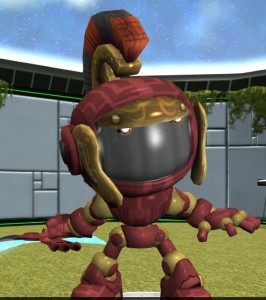 A: There’s a lot of competition in Home, and the number of developers is continuing to grow. For the Juggernaut team, forging our own path that’s a little off the beaten track from what the other devs are doing seems to be our most successful tactic. We aren’t likely to out-fashion Lockwood anytime soon, so we are better off playing to our more particular strengths, which involves a lot of out-of-the-box thinking and creative applications of Home technology! We also pay a lot of attention to the pricing structures of our fellow developers. We definitely focus on implementing competitive price points, and it seems to work very favorably for us. I think the Home community appreciates our focus on providing unique products at fair prices.
A: There’s a lot of competition in Home, and the number of developers is continuing to grow. For the Juggernaut team, forging our own path that’s a little off the beaten track from what the other devs are doing seems to be our most successful tactic. We aren’t likely to out-fashion Lockwood anytime soon, so we are better off playing to our more particular strengths, which involves a lot of out-of-the-box thinking and creative applications of Home technology! We also pay a lot of attention to the pricing structures of our fellow developers. We definitely focus on implementing competitive price points, and it seems to work very favorably for us. I think the Home community appreciates our focus on providing unique products at fair prices.
HSM: In 2012, was one or any of your items created or inspired by suggestions or comments made by Home users? If so, what were they, and which of those items was the most successful?
A: Yes, actually. We’ve run several competitions that have awarded users the opportunity to work with us to design Home content, including a MIniBots competition that allowed users to create their own minibot decorations and a photo competition for the Seven Winds decorative lounger that resulted in the recent Martial Arts pose pack. It’s difficult to say how successful these products were financially, since all the data is not in at this point. However, the main goal of these was to allow us a greater degree of interaction with the community we are developing for, and in that respect it was a huge success. We had a great opportunity to work closely with several members of the Home community and I hope that they enjoyed the experience as much as we enjoyed bringing their ideas to life.
HSM: How viable are the types of freemium gaming models used in Home and on social networks? What are the keys to developing a successful freemium model, and how should it be structured?
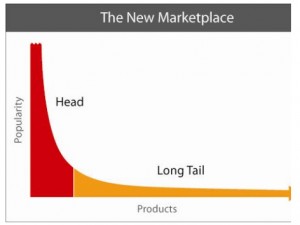 A: Let me first start off by saying that our one foray into freemium gaming was not a success, possibly in part due to the model used. I think there were several misconceptions that contributed to this failure. First off, Home is a unique community. I think the Home economy is very, very strongly controlled by a relatively small minority of users (even moreso than other freemium-driven economies) who are willing to spend a lot. I think part of our problem is that this minority wasn’t really that excited about this particular game, for a variety of reasons. I think the TPS genre may not resonate as strongly as some others, among other things. I also think we fell into what is a common trap for indie devs of trying to be the “good guy”. We play a lot of games, and we set out to develop something that WE would think is a fair model. We immediately took off the table any system that involved an in-your-face “pay now and unlock x” model. We wanted to avoid intrusive reminders that you can purchase content and we also were determined to make the game fun to play whether or not you spent money and to balance it in order to avoid creating a “pay to win” game. What we ended up with was a game that didn’t give people enough incentive or opportunity to spend money, which resulted in us losing a significant amount of money on that project. Luckily it wasn’t fatal, and we are making strong efforts towards recovering what we lost.
A: Let me first start off by saying that our one foray into freemium gaming was not a success, possibly in part due to the model used. I think there were several misconceptions that contributed to this failure. First off, Home is a unique community. I think the Home economy is very, very strongly controlled by a relatively small minority of users (even moreso than other freemium-driven economies) who are willing to spend a lot. I think part of our problem is that this minority wasn’t really that excited about this particular game, for a variety of reasons. I think the TPS genre may not resonate as strongly as some others, among other things. I also think we fell into what is a common trap for indie devs of trying to be the “good guy”. We play a lot of games, and we set out to develop something that WE would think is a fair model. We immediately took off the table any system that involved an in-your-face “pay now and unlock x” model. We wanted to avoid intrusive reminders that you can purchase content and we also were determined to make the game fun to play whether or not you spent money and to balance it in order to avoid creating a “pay to win” game. What we ended up with was a game that didn’t give people enough incentive or opportunity to spend money, which resulted in us losing a significant amount of money on that project. Luckily it wasn’t fatal, and we are making strong efforts towards recovering what we lost.
HSM: In your view, what is the appeal of PlayStation Home? What hooks a percentage of users who try it into becoming consistently active consumers, monetizing for years at a time?
A: I think PlayStation Home is unique online social experience. It affords people the ability to meet people from all over the world and interact with them in a virtual world. If I had to guess, I’d say it is the community that keeps users coming back day after day. Friendships are made and common purposes are forged. Like almost all games with any social element, the pull of our clubs, groups, guilds and friends has the power to keep us entertained and invested far longer than even the most compelling game mechanics or attractive pixel eye candy ever could.
HSM: Inevitably, the spotlight must move beyond Home; the Vita is already out, and a new console generation is close at hand. What will you do to transition out of Home, and ideally migrate your in-Home audience to your other projects?
A: Although we’d love it if Home transitioned directly into the PS4, that may not be the case. We do have to consider how best to transition to another platform. At this point nothing is certain. As long as Home has an active community, we will have a foothold here and will continue to make content. If Home (or some version of Home) is part of the PS4 then we will definitely seek to make content there as well, in hopes that the community here on the PS3 will follow along and find as much, if not more, to love on the new platform. Otherwise, we are keeping our options open for now.
HSM: The most important insight you gleaned from Home 2012.
A: Our two most important takeaways were:
- Leveraging the power of the community and fansites to create conversation and content – you can’t go wrong with this strategy.
- Change is good, removing features is bad!
HSM: Finally, what can you tell us about your areas of emphasis for 2013? Where will you be putting your resources?
A: All our resources go towards continuing to support our amazing and creative team so that they can keep doing what they do best – making amazing content, whether on this platform or another down the road.
We’d like to thank Team Juggernaut for one of the most amazing Home Q&A stories we’ve ever read.
Share
| Tweet |


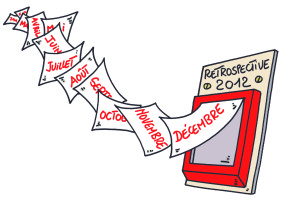
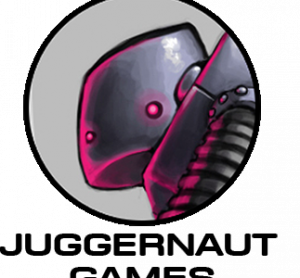

 Twitter
Twitter
Great interview, it touches on a lot of things I have been saying for awhile about Home. Juggernaut is one of my favorite developers because of the great things they make at very reasonable prices. Their new Bramblenook farm space is the best estate in Home by far in terms of functionality and fun. I can’t wait to see what they come up with next for it and for the rest of their product lines. It is sad to see that Minibots didn’t work well for them, but I still love that game anyway and Juggernaut has proven themselves to be the king of memory allocation this past year. Good article Terra.
I find it interesting that Juggernaut doesn’t know if the PS4 will have Home. But even if there is no Home perhaps the games or call them spaces if you wish could be played on the PS4. But I speculate. Noboby knows nuttin’!
Interesting interview to be sure. I’m not a fan of Cutteridge but I love Bramblenook.